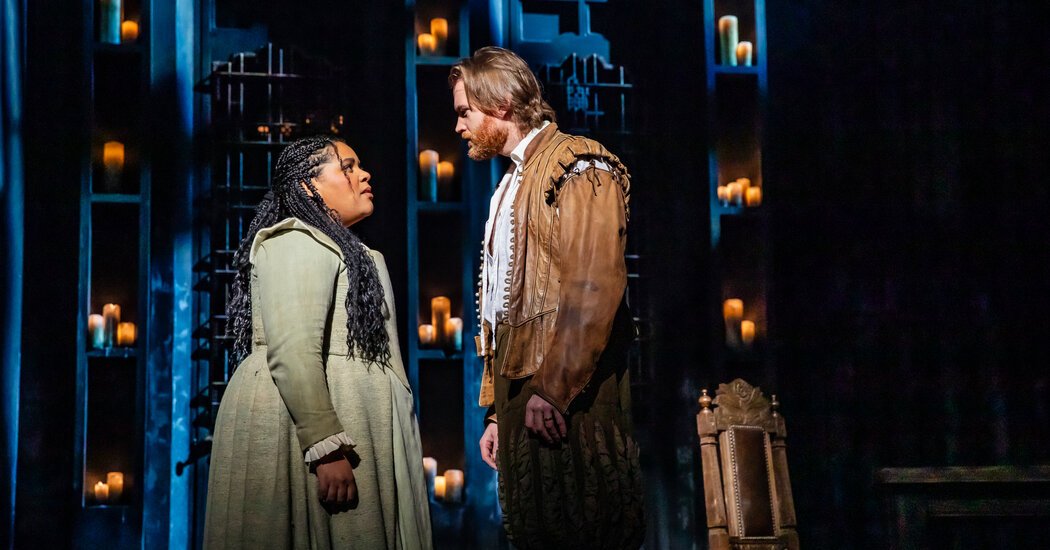[ad_1]
The catchy, folk-tinged numbers from “Treason the Musical” have been streamed online over a million times, in 96 countries. Its fans — known as “Plotters” — have been listening to an EP, an acoustic record and a live album of the songs, as well as sharing their own performances on TikTok. But until this fall, there hadn’t even been a full-scale production of the show.
Unlike “Beetlejuice,” “Heathers” or “Dear Evan Hansen,” which all parlayed onstage popularity into huge digital followings, “Treason” is turning the formula for musical success around. Its producers cultivated an online fandom for three years before raising the curtain on the show, and are now banking on those fans buying theater tickets, too.
It seems to be working. “Treason” is currently on a 27-show tour of Britain that culminates in two performances at London’s largest theater, the 2,286-seater Palladium, on Nov. 21-22.
Created by Ricky Allan, the musical tells the story of the Gunpowder Plot of 1605: a failed attempt by a group of persecuted English Catholics to blow up the Houses of Parliament in London and assassinate the protestant King James I. The show features folk ballads, rousing pop and rock numbers, and spoken word and rap, with period costumes — ruffs and capes, doublets and hose — and candle-like lighting to evoke a 17th-century setting.
As an original retelling of an episode from English history, “Treason” brings to mind another grass-roots British success story: “Six,” the hit musical about the wives of King Henry VIII. “Six” started out as a scrappy student show in the Edinburgh Fringe and grew into a professional production that is playing on the West End and Broadway. Its cast album became the second-most streamed of all time (after “Hamilton”), and its Instagram account has more followers than any West End show ever.
Building a so-called “Queendom” of fans was essential to the success of “Six,”, said Josh Bird, the show’s digital producer. “Very early on, we made the effort in replying to every comment, every message, but also encouraging the cast and creative team to do that,” he said. “So it created this online community that were part of the journey.”
When Allan was developing “Treason,” in 2020, he called on performers with existing online fan bases, including Hadley Fraser and Ramin Karimloo, who shared the show’s songs on social media as they evolved. The fans followed along as “Treason” came together into a recording, a streamed concert and two sold-out live concert performances in London.
“It wasn’t without risks. We were letting audiences in on something that wasn’t finished,” Allan said. “The risk has paid off, but it’s definitely been an interesting way round.”
Trevor Boffone, a lecturer at the University of Houston and the author of “Social Media in Musical Theater” said the sense of direct access that online platforms can provide had been a game changer for musicals. “In the TikTok age,” he said, audiences don’t need a finished product. What they care about is access to this behind-the-scenes, in-the-process footage.”
Boffone pointed to two other musical projects that started online and grew into real-world phenomena, although neither ever achieved a full stage run: “Ratatouille,” a musical version of the Pixar movie, and “The Unofficial Bridgerton Musical,” based on the Netflix show. Both became viral sensations after TikTok users suggested that those existing titles would make good musicals, and people started sharing their own songs, set designs and costume suggestions, he said.
“Ratatouille” was eventually staged as a one-off streamed production, and “Bridgerton” was released as a Grammy-winning album. (A concert version of “Bridgerton’” was shut down when Netflix filed a copyright infringement suit.)
“The more success stories we have,” Boffone said, “the more people are going to take TikTok seriously as a place to create buzz around a musical.”
Developing a show online isn’t just a creative model. Increasingly, demonstrating that a musical has an existing fan base is a way to prove commercial viability. Andy Barnes, who produced “Six” in Britain, said that producers in other countries had approached him about mounting their own productions after seeing the size of show’s online following. Broadway and the West End aside, “Six” has now been staged in countries including Australia, Canada, Germany and South Korea.
Hard data about monthly streams and shares can also help find investors. Allan said that such figures helped secure financial backing for the “Treason” tour, making it seem like a less risky proposition.
One of the “Treason” producers, Dale Franzen — who also produced “Hadestown,” another show that began with an album and had its own twisty journey to stage success — came on board ahead of the musical’s current tour. She said that she had been impressed by the approach the “Treason” team had taken to developing the show and its fan base.
“Anybody who does something differently, I’m going to be listening and watching,” Franzen said recently by phone from Los Angeles. “When I saw they went from streaming to a concert, that made a lot of sense to me,” she said. “Before spending a huge amount on a production, you know a lot more about your product.”
She said that she didn’t think the “Treason” model would work for every show. But just as fans like to feel involved, Franzen said, some investors she had approached about putting money into the show were excited by the sense of taking part in its development.
“I said, ‘This isn’t the final product; you’re seeing the process,” she said. “People love that.”
[ad_2]
